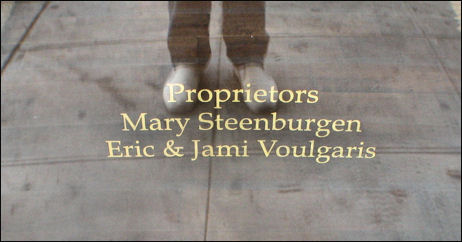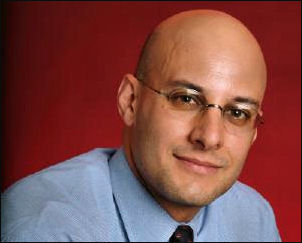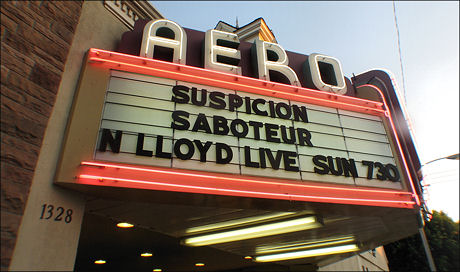HE to Resurrecting the Champ director Rod Lurie regarding his interview with Coming Soon’s Edward Douglas in which he discusses his remake of Straw Dogs: It’s a relatively minor thing, but Susan George never once “smiles” during the rape scene in Straw Dogs. She responds to the rapist in a way that indicates she’s somewhat complicit, yes, but smiling isn’t part of the repertoire.
Day: August 19, 2007
Limited “Jesse James” hangout
Fact #1: On-the-lot-screenings of Andrew Dominik‘s The Assassination of Jesse James by the Coward Robert Ford (Warner Bros., 9.21) have been few and far between. I’ve been hankering to see it for a long while, hoping to experience that allegedly painterly, Terrence Malick-y element and, if possible, share whatever love I might honestly feel, but WB publicists have their strategy.
Fact #2: The poor movie isn’t listed on the Warner Bros. website along with the other “Coming Soon”-ers (The Brave One, Michael Clayton, Fred Claus, etc.).
Fact #3: The film’s bare-bones website (trailer, synopsis, stills) hasn’t been enhanced or added to in months.
Fact #4: Jesse James is going to Toronto and producer-star Brad Pitt will be there for a day or so to promote it.
Fact #5: The Coming Soon.net Jesse James page says it’s going to have a “limited” release.
“Nanny Dairies” pan
“Taking a satirical bite out of a tightly swaddled subculture, The Nanny Diaries (MGM/Weinstein, 8,24) is to high-class childcare what The Devil Wears Prada was to high fashion. Absent Meryl Streep‘s indelible villainess, however, this new comedy rarely rises above standard sitcom fare, a bitter and ironic disappointment given the involvement of American Splendor writer-directors Robert Pulcini and Shari Springer Berman. Downbeat word of mouth will cause Diaries to fade from view. DVD future looks brighter.” — from Lael Lowenstein‘s 8.17 Variety review.

The King of Kong
Seth Gordon‘s The King of Kong: A Fistful of Quarters (Picturehouse) took in $50,294 on five screens this weekend — $16,957 on Friday, $18,249 on Saturday and an estimated $15,088 today for an average of $10,509. In short, it’s got a decent amount of heat. “This is a fantastic per-screen average,” Picturehouse honcho Bob Berney said today. (Not to me personally — I got the quote off a press release.) “The reviews were great, we really used a grass roots and viral campaign to open the film…gamers are actually leaving their computers and arcades and coming to the theatres.”
McCarthy-Rissient screening
Todd McCarthy‘s Man of Cinema: Pierre Rissient, a documentary that showed at the Cannes Film Festival (it was reviewed for Variety by F.X. Feeney on 5.19) and will play at the Telluride Film Festival, is finally having a private Los Angeles screening on Tuesday, 8.28. I was told about this screening a few days ago, received the invitation today.


Pierre Rissient, Todd McCarthy
Man-boys and smelly poos
The thing that really works for me about Superbad is that Michael Cera‘s “Evan” character is bright, dry, sensible, whimsical — an ethically upstanding guy and not all that much of an emotionally crude, sexually obsessed emotional infant. He’s not, in other words, like many (most?) leading guys in today’s comedies. Without Cera to balance out Jonah Hill, Superbad would be too sploogey and nowhere near as likable.
The Globe and Mail‘s Johanna Schneller puts it thusly: “Knocked Up, The Break-Up, Wedding Crashers, Failure to Launch, About a Boy and The 40-Year-Old Virgin, man-boys with after-school-calibre jobs — played by, respectively, Seth Rogen, Vince Vaughn (in the second and third films), Matthew McConaughey, Hugh Grant and Steve Carell.
They “are hauled into adulthood by women mature and well-employed: Katherine Heigl‘s E! correspondent, Jennifer Aniston as an art dealer, Rachel McAdams as the brainy daughter of a U.S. treasury secretary, Sarah Jessica Parker as a family “interventionist,” Rachel Weisz as a single mom. (The tagline for About a Boy is, literally, ‘Growing up has nothing to do with age.’).
“Related films include Hot Rod, Old School, Fever Pitch, Big Daddy, Shallow Hal and School of Rock.
“In them, the man-boys take smelly poos, vomit, play video games, surf Internet porn, guzzle beers, watch countless hours of TV, and masturbate. A lot. They are more childlike — more id-driven — than actual children. Yet they also manage to get those sublime women to have sex with them, and even to fall in love with them. Unlike previous generations of romantic comedies — which are beautifully explicated in David Denby‘s essay, “A Fine Romance”, in the 7.23 issue of The New Yorker — in this generation, sex comes way before love.”
Saturday night at the Aero
The restored Aero Theatre — the westside flagship for the American Cinematheque — is a single-screen venue on an affluent, relatively quiet Santa Monica boulevard. Nice people run it and nice people — a mostly older crowd — are always there. An Italian ice store is just down the the street, an antique furniture store that Mary Steenburgen is a co-proprietor of sits next to it. The whole quiet-community atmosphere is like a Valium. The vibe at the Arclight or the Bridge or the Monica Plex on Second Street is fine, but the Aero feels like yesteryear.
Last night’s experience was very much like seeing a movie on a quiet summer night in a small town in the ’60s or ’70s. The Aero is a remnant of the modest- sized, personably-managed theatres that you could find in every last small town in America before the plexing boom of the ’80s.
On top of which the sound and projection standards at the Aero are superb, and they’re always showing good films there. On a wisp of a whim Jett and I went there last night to see Alfred Hitchcock’s The Man Who Knew Too Much, and the show was all but sold out. Madeleine Stowe, whom I’ll always have a thing for because of her performance in Stakeout 20 years ago, and her actor husband Brian Benben and their daughter sat right next to us.
And it was nice to see a still-pretty-good Hitchcock film with a good crowd that laughed and “oohed” and “aahed” from time to time. There’s a moment on the Casablanca-to-Marrakech bus in the beginning when James Stewart asks an Arab-French gentleman named Louis Bernard (Daniel Gelin) why a Muslim man has gotten so upset with his son for accidentally pulling off his wife’s veil (“It was just an accident”) and Bernard replies that “Muslims aren’t very comfortable with accidents,” or words to that effect. That got a kind of murmuring dark laugh.

The downside is that The Man Who Knew Too Much didn’t look anywhere near as good as it does on the digitally remastered DVD that came out in February 2006. Not even close. Or at least, not from where we were sitting in the fourth or fifth row. The print was fairly new and scratch-free, but it wasn’t that much of a treat. Maybe if we had sat in the rear rows.
Almost all color movies from the ’50s and ’60s look somewhat underwhelming — grainy, fuzzy, under-saturated, not detailed enough — by today’s standards when you see them in a theatre. The last time I saw an older color film that looked really exceptional was when I saw Gone With the Wind at the Academy theatre two or three years ago. The digitally remastered, 4K-projected Singin’ in the Rain that played there was supposed to be pretty good also.
“Once” in Australia
In a curiously un-bylined article about Once in the Sydney Morning Herald, it is noted that while Spider-Man 3 and Shrek the Third “came, saw and conquered with more than $700 million in global box office cash each, they no longer sit in the top 30 U.S. box-office list. Once, after 13 weeks, has made more than $7 million and sits steadily in the 26th spot.

“In an era of Hollywood studio hype,” the anonymous writer also says, “$250 million budgets and comatose plots masked by stuntmen and explosions, it’s a rare treat to watch a simple but great film. This quaint rock musical love story is just that.”
Slight “Superbad” downtick
Superbad dropped 10% to 12% yesterday and is now on track to make $31.6 million by tonight rather than yesterday’s projected figure of $33,607,000. Still a phenomenal figure for a film that everyone said would tally in the region of $25 million or so.
The Friday-to-Saturday drop was typical for an under-25 niche flick (i.e., guy-appealing, strong sexual humor) — young people own Friday, the somewhat older audience comes out in greater numbers on Saturday. Two apparently stoned guys sitting next to Jett were almost weeping with laughter. Two young women sitting next to me were laughing here and there but not that much; three or four times they just went “oh, God!”
Animal Planet
I had a seat-saving confrontation with two twentysomethings at a Superbad screening at the Grove yesterday. Jett and I entered theatre #1 only a minute before the lights went down, and there were only a few scattered seats so we split up. Just as the trailers began I noticed three unmarked seats — no articles of clothing, no handbags, no newspapers sitting on them — near the back. A woman sitting to the right of these seats said they were “saved,” so I backed off. But I thought to myself, “Saved how? Because she verbally says so?”

My position is a basic Animal Planet view that you can’t “save” seats without marking them, just like dogs and wolves and coyotes mark territory by urinating on the ground and Alaskan gold miners used to stake claims with little piles of rocks. All you have to do is put something on the seat — a jacket, a magazine or an L.A. Weekly page, even a folded paper napkin. But you can’t just point to three or four seats (or six or ten seats…there has to be a limit) and say, “These are saved.” Certainly not when the lights are going down. You can try this with one or two seats, maybe, but not with three.
So I said to the girl, “Sorry but the film’s starting and there’s nothing on these seats. I’ll respect saving two but not three seats, so I’m taking the third.” And then her friend — a youngish Asian guy — sauntered along four or five minutes later, just as the film was starting, and said the seat I was sitting in was “saved.” And I said, “Verbal saves without territorial markings don’t cut it.” He went “huh?” and I repeated my opinion. He said, “So you’re not leaving?” and I said “correct.” So he stormed off, presumably to get the manager or an usher, but Part Two never happened.
On the other hand, I saved two seats once in a Santa Monica theatre with my sport jacket spread across both of them and a newspaper folded across one, and when I returned with my popcorn a guy and a girl had taken them. “Hey…I saved these seats!” I said to the guy. He gave me one of those chickenshit “who me?” shrugs. “I put my jacket on these seats!,” I told him. “Where’s my jacket?” It was on the sticky-ass floor under one of the seats. The guy wouldn’t move, but I knew he’d tossed the jacket and taken the seats in defiance of natural jungle law. I let it go but he was wrong just as I was right yesterday. Markings are everything.
Finke, Munoz on ICM situation
To hear it from Deadline Hollywood Daily‘s Nikki Finke, last Friday’s Lorenza Munoz L.A. Times article about whether or not Chris Silbermann, the 39-year-old television agent “being groomed” to lead Int’l Creative Management (ICM), can reverse the agency’s declining fortunes was late out of the gate.

ICM president Chris Silbermann
Plus, says Finke, the story contained a lead-graph error about Julia Roberts having followed Jim Wiatt from ICM to William Morris eight years ago. “Never happened,” she says.
But from a writer’s standpoint, you can’t help but admire the clarity of Munoz’s third paragraph, which is composed of a tight 21 words: “Once the runner-up to powerhouse Creative Artists Agency, ICM is no longer part of the big leagues in the movie business.” For all of her crackerjack bullwhip reporting about the agencies, I don’t recall having read a Finke sentence that conveyed the awful-truthitude of the ICM situation quite as bluntly or concisely.
(Finke wrote following on 8.14: “What’s interesting is how rival tenpercenteries are trying to use the Limato brouhaha to spin the town about ICM. Recently, I’ve heard both Endeavor and CAA use the phrase that Hollywood now has “only four major agencies,” with the implication that ICM is no longer comparable to them or UTA or Morris because of the losses to its motion picture department.” That has a certain ring, but then she adds (however correctly or incorrectly) that this claim is “ridiculous,” adding that ICM and/or its investors “are looking to buy an agency with a strong motion picture department.”)
Attempting to recover some of the agency’s former glitter.”could be the most difficult mountain Silbermann, an avid hiker, has ever climbed,” Munoz writes. “The ICM president, who until recently shared that title with [the departed Ed] Limato, is highly regarded in the television world, having put together the talent for one of ABC’s biggest shows, Grey’s Anatomy.
“But Silbermann is a virtual unknown in movie circles. Most of Hollywood’s top studio executives, including Sony Pictures’ Amy Pascal, DreamWorks SKG’s Stacey Snider and Warner Bros.’ production chief Jeff Robinov, have either never met Silbermann or have had little contact with him since he joined ICM a year ago.”

